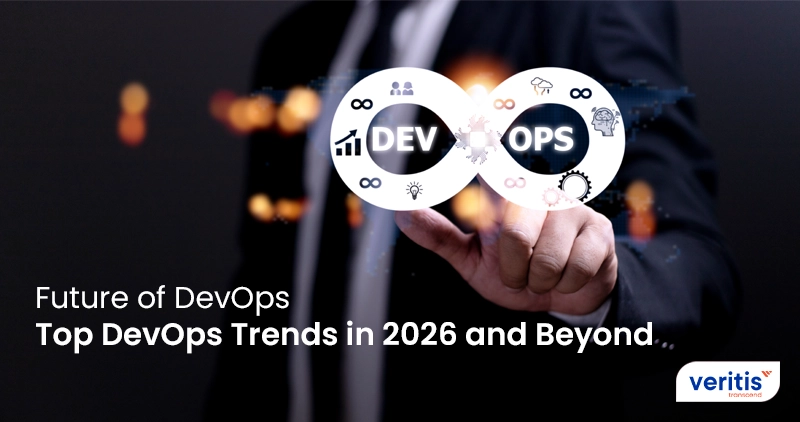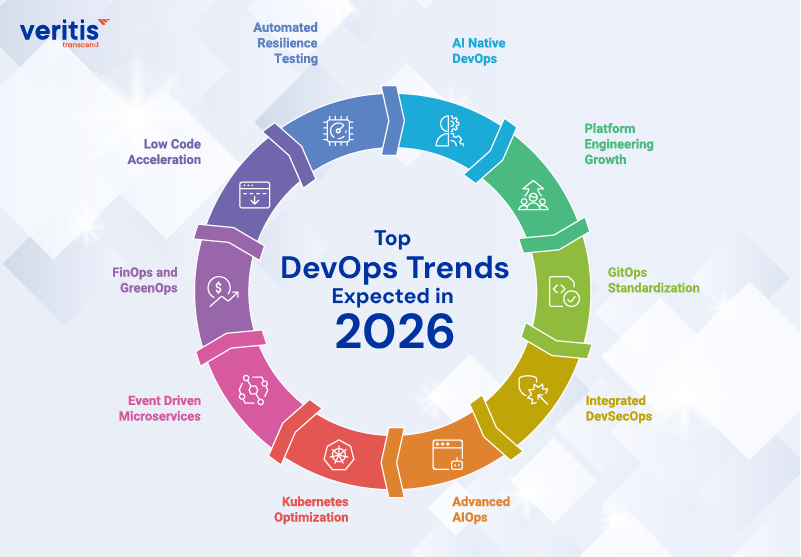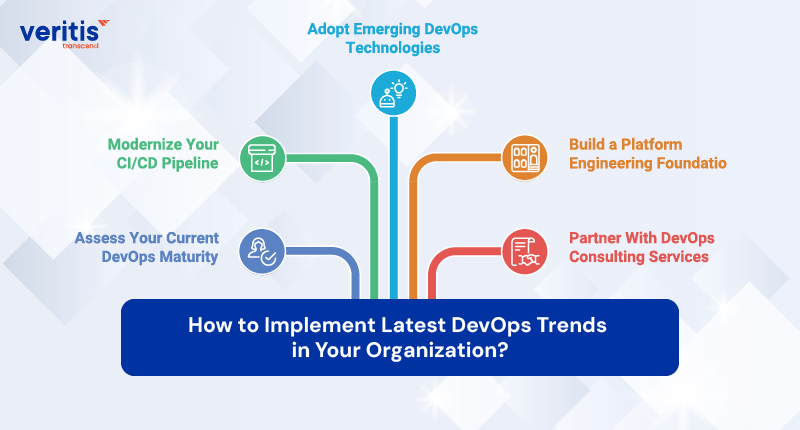
DevOps has sparked a transformation in IT practices, enabling early adopters to stay ahead of the competition. Over time, it has become increasingly clear that the DevOps process has become one of the most effective Agile frameworks, supported by bold DevOps trends shaping modern IT.
Stronger firms are more frequently implementing the DevOps adoption strategy to improve operational effectiveness and achieve quicker outcomes. Modern businesses are aware of the digital offerings that are currently popular for modernizing IT settings and are closely watching DevOps market trends and the latest DevOps trends.
The use of the DevOps process has steadily increased with new age trends. Due to contemporary software’s growing requirements and complexity, the DevOps pipeline is constantly gaining popularity. Today’s businesses need a wide range of platforms and operating systems, and this has driven stronger DevOps adoption. Instead of carrying out tasks in a predetermined manner, it is more important to grow a firm and utilize technology, including cloud native technologies and cloud infrastructure, to achieve greater scalability and resilience. These shifts also highlight the rise of emerging DevOps technologies.
The newest DevOps trends are built on best practices to help a company function better in a modern economy driven by digital development. They give businesses a new method for quickly providing value to customers. As a result, many businesses are starting to understand the DevOps process’s real potential regarding operational effectiveness and overall performance, especially with the help of modern DevOps tools and optimized CI/CD pipeline implementations.
To transition to a DevOps strategy, one must embrace open communication, transparency, higher quality, a more remarkable customer experience, and on time project delivery. These advantages highlight the need for businesses to make the most of DevOps operations to promote continuous communication, cooperation, integration, visibility, and transparency between teams working on IT development (Dev) and IT operations (Ops). DevOps consulting services can play a critical role in guiding organizations through this transformation by aligning tools, practices, and culture to business objectives. For large organizations, enterprise DevOps consulting services are essential to drive scale, efficiency, and maturity.
In addition, the adoption of Kubernetes, new techniques, and trends is making the future of DevOps quite thrilling. Let’s look at the trends in DevOps that will define the landscape in 2026.
Get a Secure DevOps Assessment
Useful link: Pros and Cons of DevOps Methodology and its Principles
Top DevOps Trends Expected in 2026

Patrick Dubois, the father of the DevOps framework, revolutionized IT practices that enterprises worldwide have adopted. The most recent DevOps trends, such as Kubernetes in production, cloud native technologies, and public clouds, are transforming how companies manage infrastructure and scale applications.
Let’s explore the key trends:
1) AI Native DevOps
AI automates up to 45 to 55% of DevOps tasks across testing, monitoring, deployment, and incident triage.
Organizations using AI augmented pipelines report:
- 60% faster deployments
- 40% reduction in MTTR
- 30% fewer production defects
AI becomes the new backbone of DevOps, not a plugin.
2) Platform Engineering Growth
Internal Developer Platforms (IDPs) reduce onboarding time by 65% and improve deployment consistency by 70%. By 2026, 80% of enterprises are expected to adopt platform engineering to standardize DevOps workflows across cloud, Kubernetes, and microservices environments.
3) GitOps Standardization
Git based automation now governs infrastructure, policy, and deployments.
Enterprises using GitOps experience:
- 75% fewer configuration drifts
- 30 to 40% faster rollback & recovery
- Higher compliance in regulated environments
GitOps shifts from “modern practice” to mandatory cloud native governance.
Useful link: DevOps Implementation: 4 Steps to Success
4) Integrated DevSecOps
Security moves inside the pipeline.
By 2026:
- 90% of DevOps teams embed automated scanning, SBOM validation, policy as code, and runtime protection
- Supply chain attacks push organizations to secure every step of the CI/CD pipeline
Security is now part of “day one development,” not a checkpoint.
5) Advanced AIOps
AIOps evolves from log analysis to predictive intelligence.
Modern AIOps platforms reduce alert noise by 85% and prevent outages before they occur.
Enterprises using AIOps achieve:
- 50% reduction in false alarms
- 3x faster root cause analysis
This marks a major leap in reliability engineering.
6) Kubernetes Optimization
Kubernetes adoption exceeds 90% in cloud first organizations.
The 2026 trend is not “adoption” but optimization:
- Multi cluster orchestration
- Cost aware autoscaling
- Traffic shaping and zero downtime rollouts
Enterprises see 35 to 40% improvements in application resilience with mature Kubernetes operations.
7) Event Driven Microservices
Microservices evolve into event driven architectures for real time workloads.
This shift provides:
- 2.5x faster feature delivery
- 50% reduction in failure blast radius
- Better horizontal scaling
Event streaming platforms have become a critical part of DevOps infrastructure.
8) FinOps and GreenOps
Cloud waste exceeds USD 21 billion annually, forcing enterprises to operationalize FinOps within DevOps.
Teams implementing FinOps see:
- 25 to 45% cloud cost reduction
- 20% improvement in resource efficiency
- GreenOps strategies tie sustainability to DevOps KPIs, especially in global enterprises.
9) Low Code Acceleration
Low code platforms shorten development cycles by 60%, while DevOps provides governance, quality, and secure release pipelines. By 2026, 70% of enterprises will use low code + DevOps hybrid models to deliver internal products faster and more cheaply.
10) Automated Resilience Testing
Chaos engineering becomes fully automated, validating resilience before deployment.
Enterprises adopting resilience testing report:
- 30 to 45% improvement in uptime
- Stronger disaster readiness
- Faster recovery during incidents
In 2026, automated resilience testing becomes as standard as unit testing.
Useful link: Why Should You Adopt DevOps and What are the Benefits it Offers?
How to Implement Latest DevOps Trends in Your Organization?

1) Assess Your Current DevOps Maturity
Begin with a clear understanding of where your teams stand. Evaluate tooling, automation depth, security practices, and culture. This establishes a baseline for adopting DevOps trends, improving DevOps adoption, and aligning with enterprise standards.
2) Modernize Your CI/CD Pipeline
Upgrade your release workflows with automated testing, policy enforcement, and continuous monitoring. Integrate the latest DevOps tools and embed security into every stage to reflect the latest DevOps latest trends and strengthen delivery speed and reliability.
3) Adopt Emerging DevOps Technologies
Introduce emerging DevOps technologies such as GitOps, AIOps, serverless functions, and Kubernetes based orchestration. These accelerate responsiveness, reduce failures, and give your teams a future ready operating model that aligns with DevOps market trends.
4) Build a Platform Engineering Foundation
Create an Internal Developer Platform (IDP) to standardize deployments, reduce operational friction, and accelerate innovation. Platform engineering strengthens enterprise scalability and supports modern trends in DevOps across cloud native environments.
5) Partner With DevOps Consulting Services
Enterprises often need specialized expertise to systemize automation, resilience, and cloud native capabilities. Engaging with Veritis for DevOps consulting services, backed by our Stevie Award recognition for excellence in DevOps, helps accelerate transformation, optimize processes, and ensure the successful execution of 2026 DevOps initiatives.
Capping it Off
The growing adoption of cloud native technologies, Kubernetes, and the expansion of public clouds will shape the future of DevOps in 2026. Companies must adapt to these technologies to stay competitive and maintain operational efficiency. With the right strategies aligned to DevOps latest trends, organizations can leverage Kubernetes in production and cloud infrastructure to scale their applications and enhance performance while ensuring robust security and resilience. This aligns closely with DevOps market trends emerging globally.
With over 20+ years in the IT industry, Veritis is well equipped to guide businesses through the evolving landscape. As a DevOps consulting company, our team of AWS Certified Cloud Consultants, Azure Certified Cloud Consultants, and GCP Certified Cloud Consultants is dedicated to delivering 100% quality solutions that empower organizations to optimize their DevOps strategies. We collaborate with leading partners like Harshi Corp and AWS to provide tailored cloud infrastructure solutions that drive scalability, security, and efficiency while supporting DevOps adoption across enterprises.
To stay ahead of these developments, businesses should consider adopting the latest DevOps trends, such as serverless computing, DevSecOps, and low code platforms. Veritis, an expert in cloud infrastructure and DevOps tools strategy, can help craft a solution tailored to your organization’s needs. Our expertise in emerging DevOps technologies ensures that your organization leverages modern automation and optimized CI/CD pipeline practices. So, reach out to us and walk away with a solution that accelerates your business and keeps you on the cutting edge of trends in DevOps powered by industry leading enterprise DevOps consulting services.
Got Questions? Schedule A Call
Additional Resources: